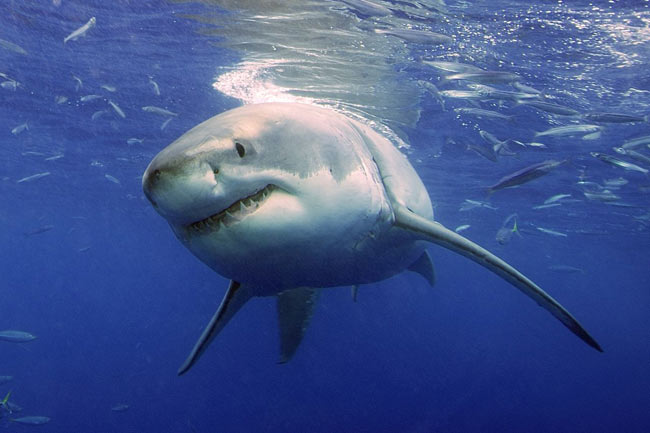Australia's Great White Sharks Always Go Home to Breed


Two populations of great white sharks frolicking in Australian waters may look alike, but researchers have found they are distinct genetically, a finding that has conservation implications.
"The genetic makeup of white sharks west of Bass Strait was different from those on the eastern seaboard of Australia, despite the lack of any physical barrier between these regions," said John Pandolfi, a chief investigator at the ARC Centre of Excellence for Coral Reef Studies, The University of Queensland.
"This shows that while the sharks can roam around Australia and across ocean basins, they repeatedly return to their home region to breed," Pandolfi added in a statement.
The researchers studied tissue samples collected from 97 great white sharks (Carcharodon carcharias) around Australia. The sharks were caught during beach-safety programs, as by-catch from fisheries or during scientific field research. Overall the genetic tests showed two different groups of great white sharks, one So-called mitochondrial DNA, which is passed down from mothers, suggested the ladies return to their birthplace; nuclear genetic tests also suggested males may do the same despite their long-distance travels. [Image Gallery: Great White Sharks]
Tracking studies had found hints of these distinct populations.
"Our tagging and tracking showed that white sharks travel thousands of kilometers," Barry Bruce of CSIRO said in a statement. "But sharks tagged and tracked off eastern Australia did not go west of Bass Strait, and sharks tagged off Western and South Australia rarely went east. When they did, they often returned, so we started to wonder whether there was more than one breeding population."
Though past research has found separate genetic populations of white sharks across vast ocean basins, this is the first to reveal such a phenomenon at a regional level, the researchers say.
Get the world’s most fascinating discoveries delivered straight to your inbox.
The researchers did find five sharks along the east coast of Australia whose genetics more closely matched that of great whites in the western Indian Ocean than Australian/New Zealand sharks. So the sharks may be trekking across oceans and sporadically breeding in "foreign" waters.
The Convention on International Trade in Endangered Species now protects great white sharks across the globe. However, the researchers note that a lack of information on the sharks, including their abundance, genetic diversity and breeding, makes it tricky to assess whether conservation programs are working.
The research was detailed online May 30 in the journal Marine Ecology Progress Series.
Follow LiveScience on Twitter @livescience. We're also on Facebook & Google+.
Jeanna Bryner is managing editor of Scientific American. Previously she was editor in chief of Live Science and, prior to that, an editor at Scholastic's Science World magazine. Bryner has an English degree from Salisbury University, a master's degree in biogeochemistry and environmental sciences from the University of Maryland and a graduate science journalism degree from New York University. She has worked as a biologist in Florida, where she monitored wetlands and did field surveys for endangered species, including the gorgeous Florida Scrub Jay. She also received an ocean sciences journalism fellowship from the Woods Hole Oceanographic Institution. She is a firm believer that science is for everyone and that just about everything can be viewed through the lens of science.


